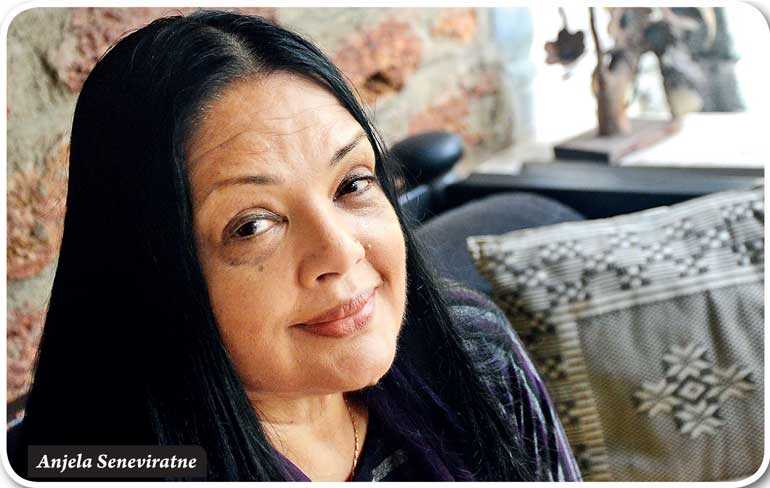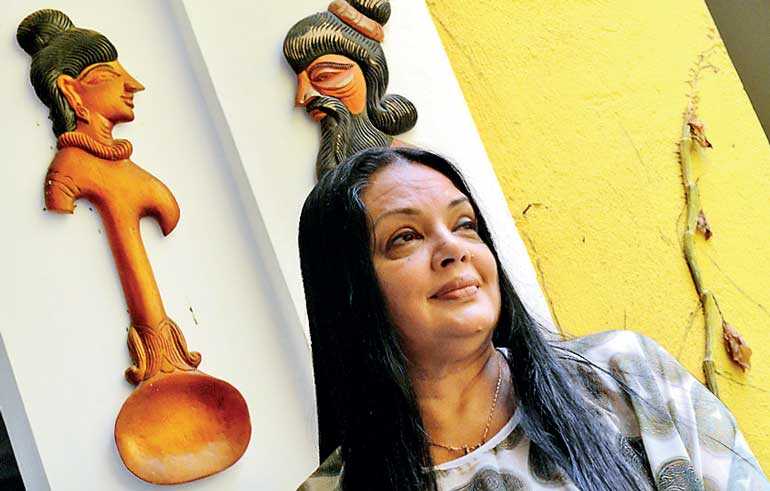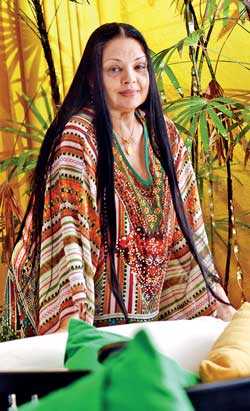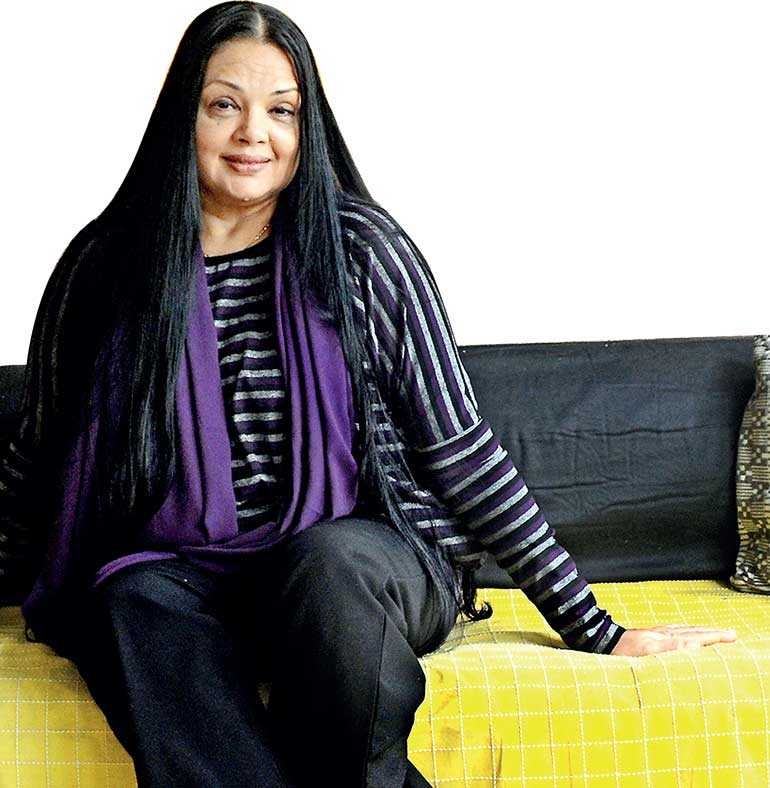Tuesday Mar 03, 2026
Tuesday Mar 03, 2026
Saturday, 7 September 2019 00:10 - - {{hitsCtrl.values.hits}}

 On The Watch List this week is fabulous and fiery Angela Seneviratne, who traces her life’s journey unflinchingly in this interview. From love and loss to triumphs and tragedies, she lays it all bare as she looks back at the last six decades and turns her face to the future with her signature strength
On The Watch List this week is fabulous and fiery Angela Seneviratne, who traces her life’s journey unflinchingly in this interview. From love and loss to triumphs and tragedies, she lays it all bare as she looks back at the last six decades and turns her face to the future with her signature strength
Q: Tell me about your childhood, your parents, siblings, and so on. Where did you grow up and what was that like?
Being the only child in the family, my childhood was somewhat lonely. My mother was a conservative Jaffna Tamil converted to be a Christian, and Daddy was a staunch Anglican with mixed parentage from the south. His mother was a Miss O’Connell with an Irish background while his father was Sinhalese.
They sent me to a boys’ school for my elementary education and I think now that it was one of the wisest decisions they made. S. Thomas’ College, Bandarawela, an affiliation of the school by the sea, was the foundation I carried in my life. My classmates of then are yet my buddies and the bond grew over the decades. My sense of oneness, no matter what our creeds, skin hues, faiths, or ethnicities were, was firmly cemented from then.
My next stint was at the Convent of St. Mary the Immaculate in Matara, where I was so influenced by the nuns that I thought I would one day get into robes myself. My time there also opened the doors to many theatrical productions, encouraged by the Sisters, and a love for English Literature under the strict tutelage of Clare De Silva, someone born and bred for the career of teaching. My favourite place to while away my time was in the musty library.
My mother and I were housed in the quaint Dutch building with a trellis veranda in the Fort, which belonged to the well-known expert on reptiles, Professor Anslem de Silva. I would pass countless bottles of brine in which snakes of every hue lay frozen in preserved death, and I would convince myself that they all watched me from their glassy confines. It was an impressionable age and scarred me for life. Never would I get over my fear of snakes!
I spent a single term at St. Lawrence’s School in Colombo before gaining admission to Bishop’s College where I remained until I left school. Being from the village, so to speak, I found life in Colombo overwhelming. My mother did her utmost in involving me with speech and drama, and church activities, such as Sunday school and the choir, a bit of social ballroom dancing under Rosemary de Kauwe and frequent trips to the British Council, which was then in Kollupitiya.
I was not allowed friends out of school or socialising of any sort. I had my forever friends called Fazilet Naseem and Shahana Ahamat to sit by my side in class and we remain friends to date. Though I had my own reservations of the trends of a high class Colombo girls’ school, I grew up with great memories of incredibly kind teachers and mates. There was no culture of bullying then.

Q: You were first thrust into the spotlight as a model. How did you get into modelling?
I must have been about 13 years old when the beautician and hair stylist Carmine Cooke spotted me and coaxed my mother to let me do some fashion photography for her. I did some Weekend Sun covers and fashion shoots and then she trained me to walk on a ramp.
I first became a model for the Jay Cee Shows and then did the first commercial advertisement for Arpiflo floor tiles while still in school. That naturally caused a rumpus and I ended up in the Principal’s Office and was advised not to do such while in school. I went into professional catwalk modelling with Yrol Jayawardena, Eric Suriyasena and Kirthi Sri Karunaratne after I left school. We lived in Talawakelle at that time of my life and it meant travelling to Colombo frequently and staying for short periods at various temporary homes of friends and even the YWCA.
In 1975 I entered for the Miss Sri Lanka for Miss World Contest and won it. Carmine Cooke was my biggest supporter at the contest and was flitting around me like a flustered mamma adjusting my saree and setting my jewellery in place. I wore a pale cream nylex saree with a lot of semi-precious stone jewellery as accessories, my hair swung below my knees, and I suppose I looked very different among the silks and kanjeevarums.
I must mention my beloved guru Kirthi Sri Karunaratne yet again at this point. It was he who made my trousseau for the Miss World Contest to be held in London in 1975, free of charge; he made me walk up and down his veranda in Norris Canal Road, rehearsing
I went into full time professional fashion photographic and catwalk modelling after I returned to Sri Lanka working with likes of Chris Fernandopulle, Kem and Maeve Martenstyn of Orientations, Yvonne Gulamhussein, Buddhi Keerthisena, and then disappeared to the Maldives on a work assignment after two years. Life changed with my decision to change my career from tourism to administration and to live there permanently. When I returned to Sri Lanka five years later I returned to catwalk modelling.
Q: Modelling led to acting. Could you tell us about how you entered the world of acting? How was the response from the public and how was the reaction from those in the industry?
I had already appeared in a German television production by the Ediriweera brothers of Ceylon Tours and then in 1976 Dharmasiri Bandaranayaka had cast Indira Jonklaas in a movie called ‘Paara Dige,’ starring Vijaya Kumaratunge. There was a need for extras and what better idea than to take the fellow models for those roles? So I was cast as one of the hero’s girlfriends, Brenda, a role that lasted about 30 seconds on screen in this black-and-white movie, where we were all made up with some hideous ochre shadow that made us look like macaws.
I did not fancy being a film star at all. But destiny had other designs for my life, as we all know. I was well-received at the time by the industry and the general public. Since I was not labelled a commercial film star, I was not a threat to the already-established artistes. I also think my physical attributes played a role in the public appreciating my entry into the industry. Thereafter it was result of every character portrayed in cinema, television and theatre.
Q: Could you describe how your relationship with Gamini began?
I had participated in the Mrs. Sri Lanka for Mrs. Woman of the World and won the title of 1st Runner Up, thus increasing my assignments in modelling. Gamini Fonseka had just cast Malini Fonseka to play the role of his wife and Geetha Kumarasinghe to play the role of the Burgher neighbour in the epic movie ‘Koti Waligaya,’ which he was planning to commence shooting on. Malini declined working on the movie for some personal reason and Geetha was thereby given her role.
He was then looking for a fair, tall, Burgher-looking girl to play the role of Dalrene when he saw one of my pictures in the Sunday Island, in Kirthi Sri Karunaratne’s fashion column. He despatched his Production Manager Tony Ranasinghe to make inquiries, and he arrived at my place of employment, The Travel Bag. I did not know whom to expect either. I was given an appointment to meet with Mr. Fonseka, whose name I had heard before but knew almost nothing about. In fact I knew more about Elvis and Jim Reeves than of Mr. Fonseka. I was not even certain of what language I was to speak with him!
I wondered therefore, as I sat nervously in his living room, why his voice boomed down the corridor even before he set eyes on me, “Mrs. Seneviratne, I happened to be educated at S. Thomas’ College Mount Lavinia!” Needless to say, the replies that followed were only a choice of “Yes, Sir,” and “No, Sir” thereon. I knew nothing of the film industry, and that mystified him who lived on the adoration of all and sundry. It perturbed him that my ignorance was indeed a fact that was difficult to digest.
His attention was scrutinising all through my work on his film, with little conversation, but drastically changed on the last day of shooting when he asked me if I would be his partner for the rest of his life. I could not quite understand his words and asked him if it was a proposal. He said I could take it any way I chose.
A few days later he turned up on my doorstep with some friends and gave me five minutes to get ready, take my baby daughter and nanny and leave with him to his friend’s home where I lived until he made our first home in Rosmead Place ready for us. Gamini then had a marriage ritual in the Hindu temple and we began our life together. My baby daughter was from my first marriage.
I married a Maldivian in 1980 and had my daughter in 1981. I returned to Sri Lanka in 1982 after getting divorced and met Gamini in 1983.
Contrary to some vicious stories spread, the truth was that it was not I who caused Gamini to separate from his wife. He had separated from her long before and what people do not talk about is the matter of all the relationships he had before and the one after me.
It was so manipulated to seem like they had a wonderful and harmonious marriage till he died. That was not the truth by any means. His marriage was over before he knew me and they never reunited as long as he was alive.
Q: Despite being together for so long, why did he not marry you?
I cannot really answer that question. In the first place he was disillusioned to believe his marriage did not even exist as his mother objected to that union. He believed that something called ‘Katu Gaseema,’ which in local terms was the dissolution of marriage, was done. He made me go to the Registrar of Marriages to search for his records and I found it. He was advised by his lawyers to marry under the Muslim law but he did not want to do that, saying he was married to me anyway, and that a piece of paper was meaningless.
Marriage, as I think now, is a matter of choice. If one really wants to, one would somehow. So I guess he did not. I guess I was too timid to question him, as I feared him and his lack of anger management. It is not so important in other parts of the world where serious relationships are recognised just as marriages are, even in law. Our relationship for everyone’s understanding was accepted by the Presidents of the time, the Parliament, and even the Court of Law, and the media, and no one dared say a word to the contrary while he was alive.
Q: He may have had his reasoning but it resulted in you and your children having to face a lot of criticism and hardship which has followed you through the years. In hindsight, do you regret playing along?
He protected us from the world in every way imaginable and no one dared to say a word while he was alive. He also thought he could do that through eternity. The protection took a different dimension with the children in my care. Life was indeed hard, I had challenges in giving my children the same lifestyles as they were accustomed to. But having said that, my girls had their own strengths to battle through dark times and be victorious. And I’m proud of them. My years with him made me strong and much later in life, I realised I feared nothing and no one after him. Therefore in all honesty I do not regret playing along.
Q: Despite his public persona as a gentleman, Gamini was an abusive and possessive partner in private; he even had extreme rules about what you wore and who you could associate with. Why did you stay with him for so long and how did the relationship finally end?
Yes he was insanely possessive and insecure more so because of the 22-year age difference, which I was blind to. It consumed his existence and became impossible to bear. I feared the repercussions, and bore the pain and suffering till I could no more. I seesawed with my own thoughts and at a point dared to flee, with the strength of someone willing to marry me and take care of my children. As fate determined, that did not work out as smoothly as I hoped. I then decided my children’s lives meant more than mine and went back to Gamini. Life was peaceful once more, until one of his associates poisoned his mind saying I had returned to end his life. I left, never to return.
It meant I lost all three children as well as they were kidnapped from my home, denied access, and I had to fight embittered battles in Court for their custody. I slipped into their school at their intervals just to hug my younger baby for an hour. The elder one despised me so much she would send her emissaries to question why I was there! They were so poisoned that they rejected me in every way.
I never gave up though my heart was shattered every single day. When I finally gained custody even before the Courts determined the order, it was another uphill and arduous climb to undo the damage.
 I do not think I made a very good mother, for I had no handbook of how to, or advice in parenting. I had no support system either and went by protective instincts and the need to provide as my main guidelines, which I now think was absolutely not adequate.
I do not think I made a very good mother, for I had no handbook of how to, or advice in parenting. I had no support system either and went by protective instincts and the need to provide as my main guidelines, which I now think was absolutely not adequate.
My relationship turned toxic while I was with him, and ended on a worse note, fuelled by interested parties and the next woman in his life, who made my children turn against me.
Q: Now that Gamini is gone, why do you believe that he watches over you in his afterlife and light a lamp for and worship his picture when he treated you so badly in this life?
I am grateful that he steered my career to where I am now, I feel I am protected even now within the industry because of who he was. I hold him in a high place of respect because he is the father of my beloved children. The love my children have for their father has no boundaries or limits, and it is my way of preserving it.
Q: How was your relationship with his wife and his other children?
His late wife was a beautiful and gracious lady with such a pure heart, who showed me nothing but kindness at every juncture. She had a heart big enough to love everyone, and that included my children. She was and will always be “Amma” to my daughters.
She brought up her own four children to whom she gave her entire life with devotion to be good and kind human beings and succeeded. They have very strong bonds as siblings which I thank God for.
Of the men who married into the family, all of them well-placed in life, the one who married Gamini’s eldest daughter was and is the pillar of strength. There was one who molested my 10-year-old daughter who was in Gamini’s care and I was coerced not to talk about it because of the shame it would bring upon the family and the repercussions on Gamini’s health. I gave in foolishly but I regret that because my daughter was severely mentally traumatised. The paedophile went on with his life, unconcerned, making films and gathering accolades.
Q: How many times have you been married?
I first married Mohamed Ismail Shameem, a Maldivian, with whom I have a very amiable relationship even now, being “Ammi” to his children of other marriages as well. He was and still is an easy going, uncomplicated human being whom no one can get angry with.
Then came the partnership with Gamini.
After that I married Eraj Abeywardena, in 1996. He is a respected and senior hotelier, unruffled, quiet, non-violent, non-abusive, and most of all, loving to all my children and grandchildren.
Q: Over the years, wild rumours have been doing the rounds about how your long hair was chopped off against your will – some say Gamini did it, some say it was done to punish you for an alleged relationship with a powerful politician, some say it was an angry lover. What really happened?
Sigh… Those rumours! It took me a long time to realise that it only takes one mouth to spread a story, whether true or false!
No! It was not Gamini who cut my hair. No! It was not done by the wife of the late President Premadasa to punish me for allegedly having a clandestine relationship with their only son, the President aspirant, whom I have never known personally. And no! None of them threw acid on my face or person at any time in my life.
It was done by my one-time fiancée at a moment of uncontrollable fury over something I cannot even remember now, which he sorely regretted. He was forgiven and my hair grew back to its original length and life went on. I cannot understand why people make such a huge issue when it was not so for me!
Q: Tell us about those you take most pride and joy in – your children and your grandchildren?
I consider the eldest daughter of my first husband as my very own and her children, a 20-year-old son and a 15-year-old daughter, as my grandchildren, the same way as I have Shiarana, my eldest daughter, who is married to Ruslan Khalaileh, a Jordanian, and has a four-year-old son. Shiarana is now a senior Cabin crew member with Royal Jordanian Airlines and has made Jordan her permanent home.
My second daughter is Kaushalya, a musician and singer, married to Anton Mark, a Sri Lankan, and they have two adorable daughters, the elder of whom is four years old, and the baby nearly two years old. They live in Melbourne
My youngest is Poorni, a hotelier, who is married to Jeremy Lauricort, a Mauritian, and is a mum to a four-year-old son.
Q: You’ve faced a lot of abuse and hardship over the years – mostly owing to your beauty – and overcome all of it with enormous strength and held your head high through all the attacks. Looking back on the last six decades, a week away from your birthday on 14 September, how would you describe your life’s journey, what do you wish had happened differently and what do you hope for in the future?
It is each one of my scars, tribulations and challenges that made me who I am today. My looks drew people to me, I admit, but those who remained in my life know me for who I really am and not many can say they know me personally. Life has taught me to keep my inner circle very small. All of my closest friends are really longstanding.
I am unabashed to admit I have trust issues and therefore I am secure with those who are honest and loyal. I forgive because it is easier on my own heart and mind. I acquired the ability to stand dignified, knowing within my conscience that I intend no harm or evil. I’m thankful to God for bringing me across the turbulence. When I look at myself in the mirror, the scars are not visible. The furrows in my face are only laughter lines.
Q: To end, what is your hope for Sri Lanka at this critical juncture, post the devastating Easter attacks and on the cusp of decisive elections?
A: It is my fervent hope and prayer that we will have a leader whose primary interest would be the country and its people. I selfishly hope that they would see me as an instrument in the endeavour and entrust me with a task to make our land look good to the world in some way. It is time I did my bit, but on a powerful platform. It is also my hope that the forgotten brigade of artistes who entertained the land are looked after with pensions, insurance, aid in health and medication, hospitalisation, housing, and free travel on public transport, and are given honour and financial assistance for funerals.
Pix by Shehan Gunasekara
